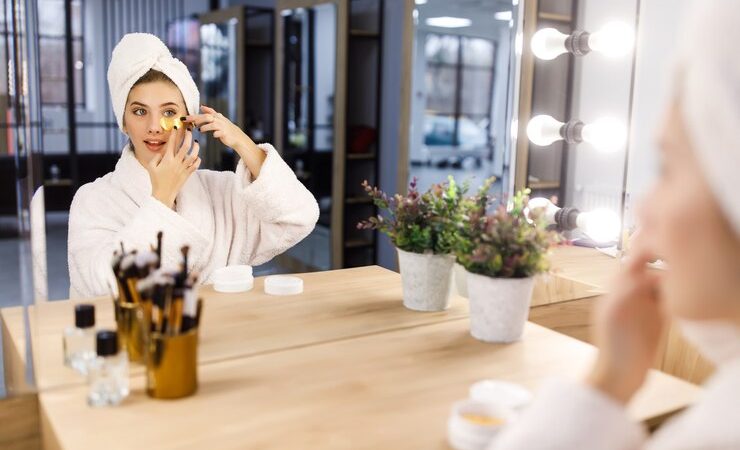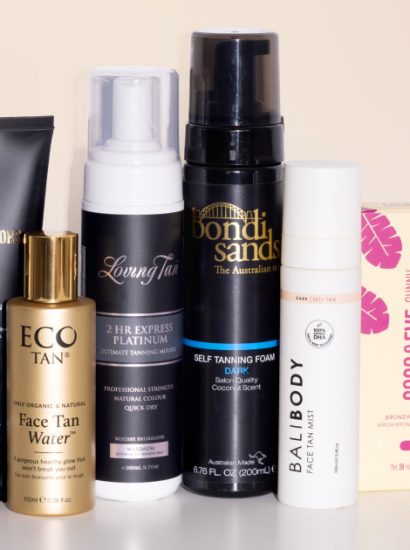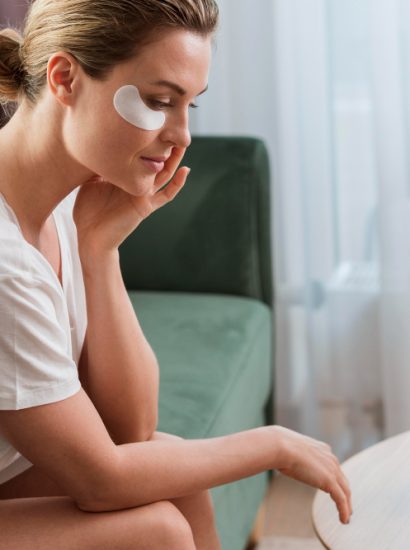Maintaining healthy, radiant skin requires more than just occasional care. A consistent, well-structured skincare routine that adapts to your skin’s needs, from morning to night, is key. With so many products and techniques available, it can be overwhelming to know where to start. This guide will break down a complete skincare routine, focusing on each step and how it can benefit your skin throughout the day and night.
Understanding the Importance of a Skincare Routine
A daily skincare regimen is essential for keeping your skin balanced, nourished, and protected from environmental stressors. In the morning, your routine should focus on protection and hydration to defend against pollution, UV rays, and other factors you encounter during the day. At night, the goal is repair and recovery as your skin regenerates while you sleep. Whether you have oily, dry, combination, or sensitive skin, a personalized morning and evening routine can keep your skin looking its best.
Morning Skincare Routine
Your morning routine is all about prepping your skin for the day ahead. The focus is on hydration, protection, and keeping your skin’s barrier intact. Here’s a detailed breakdown of a comprehensive morning skincare routine:
Cleansing (Gentle Face Wash)
The first step in any skincare routine is cleansing. Overnight, your skin produces oil, and impurities can accumulate, so a gentle cleanse is essential to start your day fresh. Choose a cleanser suitable for your skin type. For oily or acne-prone skin, a gel or foaming cleanser with salicylic acid may be beneficial, while those with dry or sensitive skin should opt for hydrating cleansers.
Why it’s important
Cleansing removes dirt, excess oil, and other impurities, ensuring your skin is clean and ready for the next steps.
Toner
Toners help restore the skin’s natural pH balance after cleansing and remove any leftover traces of makeup or debris. Look for toners that are alcohol-free and formulated for your skin type. Hydrating toners containing ingredients like hyaluronic acid or rose water can boost moisture, while exfoliating toners with glycolic or lactic acid can gently remove dead skin cells.
Why it’s important:
Toning preps the skin to absorb moisturizers and serums more effectively, leaving it refreshed and balanced.
Serum (Vitamin C or Antioxidants)
In the morning, it’s beneficial to use a serum packed with antioxidants like Vitamin C to protect your skin from environmental damage. Vitamin C helps brighten the complexion, evens skin tone, and neutralizes free radicals that can cause premature aging. Other antioxidant-rich collagen production.
Why it’s important:
Antioxidants protect the skin from oxidative stress and environmental aggressors, improving skin tone and radiance. Serums can include niacinamide, which soothes and reduces inflammation, or peptides to boost
Eye Cream
The delicate skin around the eyes is prone to puffiness, dark circles, and fine lines, making eye cream an important part of your morning routine. Look for eye creams that contain caffeine to reduce puffiness, peptides to firm the skin, or hyaluronic acid to hydrate.
Why it’s important:
Eye creams target specific concerns like dark circles and puffiness, ensuring a youthful, rested appearance.
Moisturizer
Regardless of your skin type, hydration is key. A lightweight, non-comedogenic moisturizer is ideal for oily or acne-prone skin, while those with dry skin may benefit from richer, cream-based formulas. Look for moisturizers with hydrating ingredients such as glycerin, ceramides, and hyaluronic acid, which help maintain moisture levels without clogging pores.
Why it’s important:
Moisturizers seal in hydration, prevent water loss, and strengthen the skin’s barrier, keeping it soft, smooth, and plump.
Sunscreen (SPF 30 or Higher)
The final and most crucial step in your morning skincare routine is sunscreen. UV rays are the leading cause of premature aging, hyperpigmentation, and skin cancer. Even if you’re indoors, sunscreen is essential because UVA rays can penetrate windows. Opt for a broad-spectrum sunscreen with SPF 30 or higher.
Sunscreen protects the skin from harmful UV rays, preventing sunburn, premature aging, and reducing the risk of skin cancer.
Nighttime Skincare Routine
At night, your skin enters repair mode, making it the ideal time to focus on treatments that repair damage, boost hydration, and promote cell turnover. Here’s how to structure your evening routine:
Double Cleansing (Oil Cleanser + Water-Based Cleanser)
A nighttime cleanse is more intensive to remove makeup, sunscreen, and dirt accumulated during the day. Double cleansing involves starting with an oil-based cleanser to dissolve makeup and sebum, followed by a water-based cleanser to thoroughly cleanse your skin.
Why is important:
Double cleansing ensures that your skin is deeply clean, removing all traces of makeup and impurities that can clog pores.
Exfoliation (2-3 Times a Week)
Exfoliation helps remove dead skin cells, promoting smoother, brighter skin. You can choose between physical exfoliants (scrubs) or chemical exfoliants (AHAs or BHAs). Chemical exfoliants are generally gentler and more effective in promoting cell turnover without irritating the skin.
Why it’s important:
Regular exfoliation keeps your skin smooth, prevents clogged pores, and enhances the effectiveness of other products.
Toner or Essence
Like in the morning, using a toner at night can help restore your skin’s pH balance and provide an extra layer of hydration. An essence, which is similar to a toner but typically more hydrating, can also be used at this step.
Why it’s important:
Toners and essences prep the skin for better absorption of serums and treatments.
Treatment Serum (Retinol or Other Actives)
Nighttime is ideal for using treatment serums that target specific skin concerns, like acne, pigmentation, or fine lines. Retinol, a derivative of Vitamin A, is a popular choice because it promotes cell turnover and collagen production. If you’re using retinol, start with a low concentration to avoid irritation.
Why it’s important:
Retinol and other active ingredients work to repair the skin, promote regeneration, and address specific concerns like acne or aging.
Eye Cream
The skin around the eyes benefits from extra hydration at night. Using a nourishing eye cream with peptides, retinol, or hyaluronic acid helps to minimize fine lines and dark circles over time.
Why it’s important:
The eye area is particularly delicate, so using targeted treatments can help delay signs of aging and reduce puffiness.
Moisturizer or Night Cream
Your nighttime moisturizer can be richer than your morning one, as your skin loses moisture while you sleep. A night cream or a sleeping mask with ingredients like ceramides, squalene, or peptides can lock in moisture and repair the skin’s barrier overnight.
Why it’s important:
Night creams provide deep hydration and repair while you sleep, ensuring you wake up with soft, rejuvenated skin.
Face Oil (Optional)
For those with particularly dry or mature skin, adding a facial oil as the final step can seal in moisture and give your skin a radiant glow. Look for oils like argan, marula, or rosehip, which are non-comedogenic and rich in nutrients.
Why it’s important: Face oils provide an extra layer of nourishment, helping to balance the skin’s natural oils and reduce water loss.
Conclusion
A consistent skincare routine tailored to your specific skin type and concerns is the key to maintaining healthy, radiant skin. From gentle cleansing to protecting your skin from environmental damage in the morning and focusing on repair and hydration at night, each step plays an essential role in your overall skin health. Remember that skincare is not one-size-fits-all, and it may take some trial and error to find the products that work best for you. However, by sticking to a morning and nighttime routine, you can achieve long-term results and keep your skin looking its best.
FAQs
How often should I exfoliate my skin?
Exfoliating 2-3 times a week is generally enough for most skin types. Over-exfoliating can damage your skin barrier, leading to irritation and sensitivity, so it’s important to find the right balance for your skin.
Can I use the same products in the morning and at night?
Some products can be used both morning and night, such as cleansers and moisturizers. However, certain ingredients like retinol or exfoliating acids are better suited for nighttime use, while antioxidants like Vitamin C and sunscreen should be reserved for the morning.
Do I really need to use sunscreen if I’m indoors all day?
Yes! UVA rays can penetrate windows, so it’s important to wear sunscreen even if you’re inside. Make sure your sunscreen is broad-spectrum to protect against both UVA and UVB rays.
How long should I wait between applying different skincare products?
You should wait a minute or two between each step to allow the product to absorb into the skin. Serums and treatments usually need more time to sink in before applying moisturizer.
Is it necessary to use a different cleanser in the morning and at night?
While it’s not strictly necessary, some people prefer using a lighter cleanser in the morning and a more thorough one, such as an oil-based cleanser, at night to remove makeup and sunscreen.
This guide to a morning and night skincare routine covers all the essential steps to help you maintain
Also read : Pore Cleansing: The Ultimate Guide to Clearer, Healthier Skin





